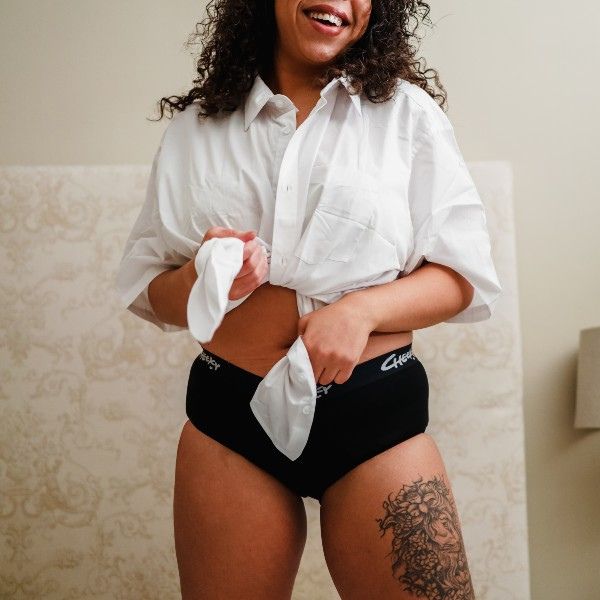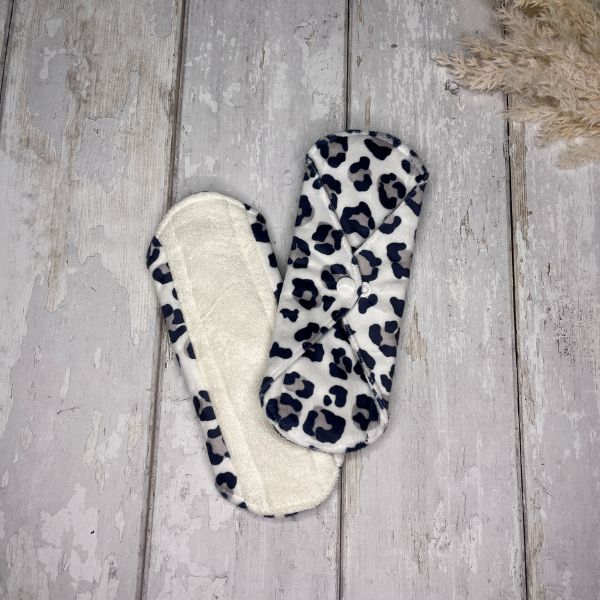How to Have a Zero Waste Period
National Geographic say "a combination of technology and social pressure drove us to sanitary products shot through with plastic".
We have been polluting our environment with plastic sanitary products since the mid 20th century but because it is classed as medical waste it is not tracked.
Your periods will probably last around 40 years (gulp!) with a five day period monthly this means you are bleeding for six and a half years. 5.8 billion tampons were bought in America last year alone and most will end up in landfill or worse - in our water ways!
Beach cleaners find thousands of plastic tampon applicators. Every plastic disposable pad and tampon EVER used is still here contaminating the environment, breaking down into micro plastics entering wildlife and even our bodies - and will be for at least another 500 years.
Disposable pads and tampons are supplied packed together in plastic wrap, then wrapped individually inside in plastic, with plastic applicators, plastic strings, plastic backing, plastic incorporated inside them both to hold their shape and absorb! Eco friendly tampons and pads are an improvement but still mean throwing things away monthly.

Everything about the disposable sanitary product industry is designed to keep things discreet and easy to hide. Periods have long been associated with shame and secrecy. This does nothing to help our young girls and women maturing into our modern world filled with the hope of readily available birth control, International Women's Day, of the Me Too movement, of gender equality and equity.
Enough of the negative impact your periods can have, let's flip this to the positive zero waste ways you can manage your menstrual cycle.
Not only can you manage your impact on our environment, reducing your carbon footprint and your landfill quota, you will also save money, feel more comfortable and never run out! Throw in the added bonus of no toxic materials near or INSIDE your body risking toxic shock syndrome - winning! Our guide looks at the pros and cons of each method.
Here's how to have a zero waste period -
1. Period Pants
Zero waste reusable period pants are becoming the staple go to for periods, especially for the younger generation. Being able to just wear pants for the majority if not all of the day at school couldn't be easier when you are on your menstrual cycle.
Most PSHE classes will only cover tampons and disposable pads which are thrown away after a few hours of use. Cheeky wipes offer schools the chance to have demo reusable pads and washable pants to show their students alternative options.
Washing menstrual underwear is easy too - just rinse when you first remove (or when you get home), wash at 30 degrees with your everyday washload avoiding fabric softener, and hang to dry avoiding direct heat. Turning the period panties inside out helps them to dry quickest.
They come in many styles and designs. From high waisted or even side opening, there are absorbencies to suit everything from light days to heavy flooding days, so you can carry on as normal through your period.
Reusable period undies can be sold on if outgrown or when worn out they can be broken down to remove the TPU layer and popped in a textile recycling bin or composted.
"I bought period pants and a period starter pack. All the products I buy from them are great quality. They wash well and are very absorbent. I will definitely buy from them again and again and again." Helen, Feb 23 trustpilot
2. Menstrual Cups
These have been around longer than you would think! Cups were first around nearly a hundred years ago and now reinvented with medical grade silicone, cups can be used to replace wearing a tampon if you need or prefer internal protection.
Reusable cups sit low in the vaginal canal and instead of absorbing menstrual blood,it collects it ready to be emptied into a toilet or sink.

Just fold the lip into itself, insert the cup like an upside down bell just as you would a tampon and give a little twist to release any suction. To remove, bear down and it should slide within reach of your fingers. Some come with a stem or loop which you can grip but most snip this off to make them more comfortable (just don't snip into the actual cup).
Period cups can be a little bit fiddly and I once ended up with hands covered in period blood where it slipped in a public toilet while I was removing the cup but with some experience and a bottle of water you can sort yourself out completely inside the toilet stall. They can be worn for up to twelve hours depending on flow so changing out and about might not be an issue.
Just wash the cup and wash your hands before and after inserting and give it a sterilise by boiling it in a pan of water on the hob for 5 or 6 minutes when you first use it and at the beginning and end of each cycle.
For heavy periods, back up with a cloth pad - I fill a cup in two hours.
Whilst they save lots of waste going to landfill there is no way to recycle or degrade menstrual cups so that is worth considering if you want to be truly zero waste.
3. Reusable Pads
Modern cloth sanitary pads have moved on from the belt and loops system we heard our Grandmothers speak about. The menstrual pads are made from soft natural fibres - normally cotton or bamboo, with poppers in place of sticky backing and with varying levels of absorbency to suit all flows.
They popper into your underwear in the same way that disposable pads stick in, with wings that fold under your gusset to popper together. When you remove the pad, instead of wrapping in plastic or toilet roll and dropping into the bin, fold it in on itself and popper shut and drop into a wetbag to take home and wash, no mess, no smell, no rustling, no fuss!
Washing reusable sanitary pads is easy too - rinse when you first remove (or when you get home), wash at 30 degrees with your everyday washload avoiding fabric softener, and hang to dry avoiding direct heat. You don't even need pegs as they can popper around a washing line.
Some of my cloth pads are over 12 years old but if you find you no longer need your pads they can be sold on preloved boards, they are 100% recyclable, dismantled and fabric parts can be composted or recycled in textile bins at the tip.
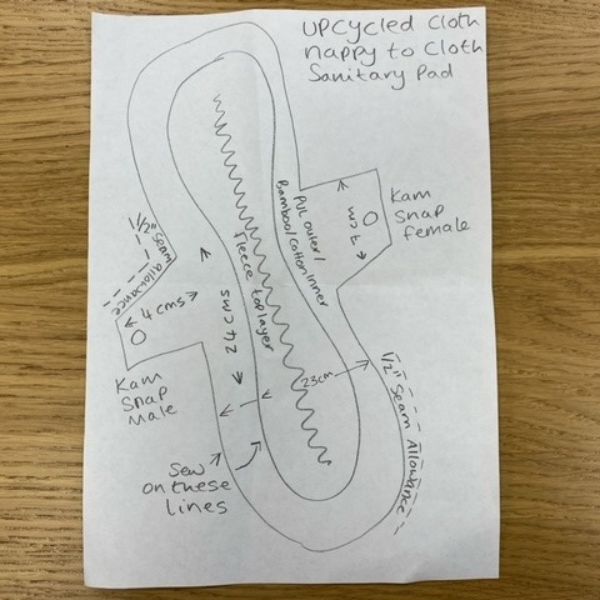
You can repurpose fabrics from your outgrown or unused clothes and find waterproofing from babies cloth nappies, old wetbags, raincoats to make your own washable cloth pads.
Reusable pads are also brilliant for managing symptoms of urinary incontinence if little leaks are a problem for you.
"Life changing. Having always found tampons and disposable pads irritating these are an absolute life changer. Would highly recommend. " April, Feb 23 trustpilot
4. Biodegradable Tampons
Reusable absorbent tampons can be made from a length of fabric with sewn on string that you roll up into a cigar shape and insert- they can be bought new on sites like etsy or home made using patterns found online.
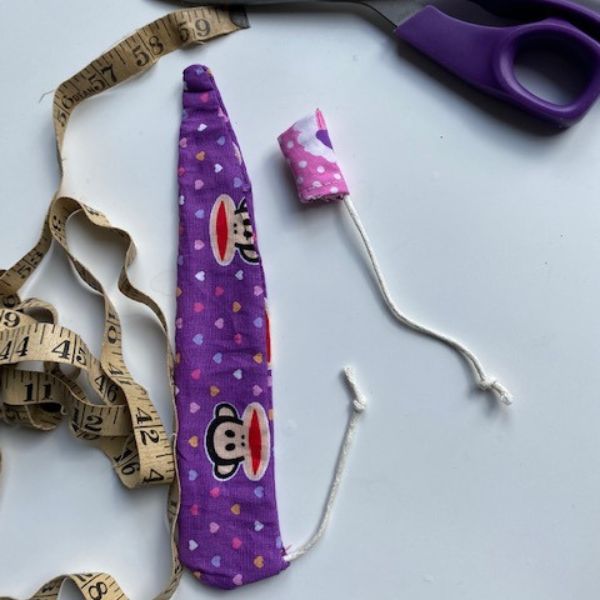
They are easy to wash and dry as they roll back out. It is carbon neutral if you use old clothes and they can be easily recycled.
5. Menstrual Sponges
Period sponges are a natural, biodegradable, non synthetic alternative to tampons and cups if you need internal protection. Sea sponges are aquatic organisms that filter sea water so swell to absorb liquids well.
They are quite tricky to insert - it can feel a bit like stuffing a turkey! Wet the sponge, squeeze out excess water and insert. You can cut the sponge down to the perfect size for you.
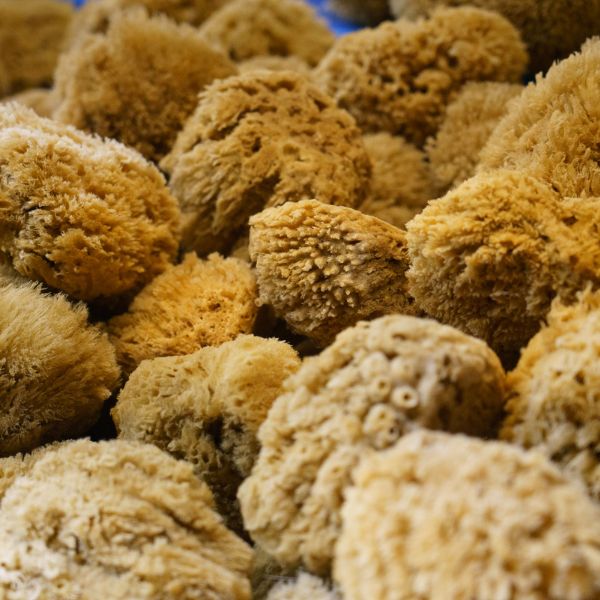
At the end of your cycle soak in water with a few drops of teatree oil or a tablespoon of bicarb or apple cider vinegar then fully dry before storing
There are some concerns that sponges can carry bacteria, grit, sand - my one arrived with a little bit of coral inside! They are not suitable for overnight and they would also need to be discarded after 6 months to a year.
6. Free Bleeding
Free bleeders turn their backs on period stigma and allow the blood to flow freely not hiding this basic bodily function and nothing is worn to try and 'catch' the menstrual flow. There is a school of thought that by controlling the pelvic floor muscles and tuning into your cervix you can sense when it is about to expel the flow and you can go to the toilet and relax the pelvic floor to allow the blood out.
Some see the free bleeding movement as a feminist statement to the inequality and stigma surrounding periods and to highlight period poverty around the world. Kira Ghandi free bled through the London marathon to highlight the plight of women being stigmatised for their periods.

Action aid says "Access to menstrual products, safe, hygienic spaces in which to use them, and the right to manage menstruation without shame or stigma, is essential for anyone who menstruate. But for many, this is not a reality. This is not just a potential health risk - it can also mean girls' education, well-being, and sometimes entire lives are affected"
If you found this useful you may enjoy or blogs on -
The ultimate guide to sleeping on your period
Can you prevent leaks on your period
Natural remedies for period pain
As always, if you're unsure of what you need to make the switch to our easy reusable nappies, please do drop the team a line or use the online chat function. The team all use the products themselves and just LOVE to chat pee poo and periods, all day long, nothing is TMI and we all love to overshare based on our own experiences...
About the Author: Kirstin is part of the Customer Experience team at Cheeky Wipes, which since 2008 has been selling the original reusable wipes kit. She is mum to 3 and loves the forest, the sea and the hills!
Along with the rest of our crack team, she spends most days talking about bodily functions and loves a chance to overshare. The business was recognised with a Queens Award for Enterprise in Sustainable Development in 2021, celebrating their hard work over the last 13 years.
